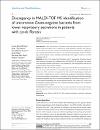Discrepancy in MALDI-TOF MS identification of uncommon Gram-negative bacteria from lower respiratory secretions in patients with cystic fibrosis

View/
Date
2015-04-30Author
Abdulwahab, AtqahTaj-Aldeen, Saad
Ibrahim, Emad Bashir
Talaq, Eman
Abu-Madi, Marawan
Fotedar, Rashmi
...show more authors ...show less authors
Metadata
Show full item recordAbstract
Introduction: Early identification of microbial organisms from respiratory secretions of patients with cystic fibrosis (CF) is important to guide therapeutic decisions. The objective was to compare the accuracy of matrix-assisted laser desorption/ionization-time of flight mass spectrometry (MALDI-TOF MS) relative to the conventional phenotypic method in identifying common bacterial isolates, including nonfermenting Gram-negative bacteria, in a cohort of patients with CF.
Methods: A total of 123 isolates from 50 patients with CF representing 14 bacterial species from respiratory specimens were identified using MALDI-TOF MS in parallel with conventional phenotypic methods. Discrepancies were confirmed by 16S ribosomal RNA (rRNA) gene sequencing in five Gram-negative isolates.
Results: The MALDI-TOF MS managed to identify 122/123 (99.2%) bacterial isolates to the genus level and 118/123 (95.9%) were identified to the species level. The MALDI-TOF MS results were 100% consistent to the species level with conventional phenotypic identification for isolates of Staphylococcus aureus, Pseudomonas aeruginosa, Haemophilus influenzae, Streptococcus pyogenes, Achromobacter xylosoxidans, Stenotrophomonas maltophilia, and other uncommon organisms such as Chryseobacterium gleum and Enterobacter cloacae. The 5/123 (4.6%) isolates misidentified were all Gram-negative bacteria. The isolation of E. cloacae and Haemophilus paraphrohaemolyticus may extend the potentially pathogenic list of organisms isolated from patients with CF.
Conclusion: Although the technique provides an early identification and antimicrobial therapy approach in patients with CF, limitation in the diagnosis of uncommon Gram-negative bacteria may exist.
Collections
- Biomedical Research Center Research [841 items ]
- Health Sciences-CAS (pre 2016) [151 items ]

